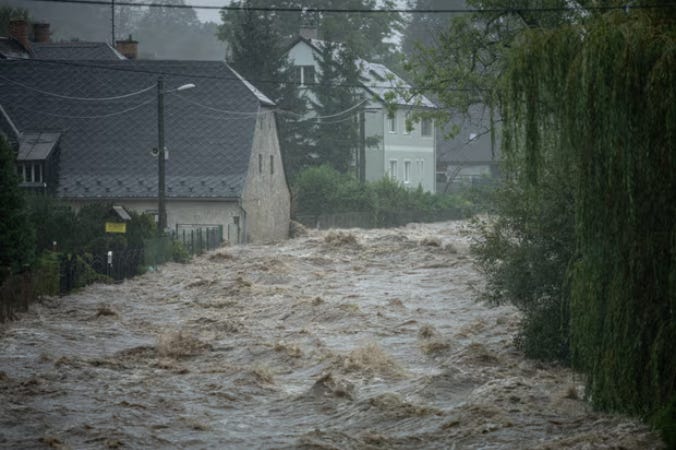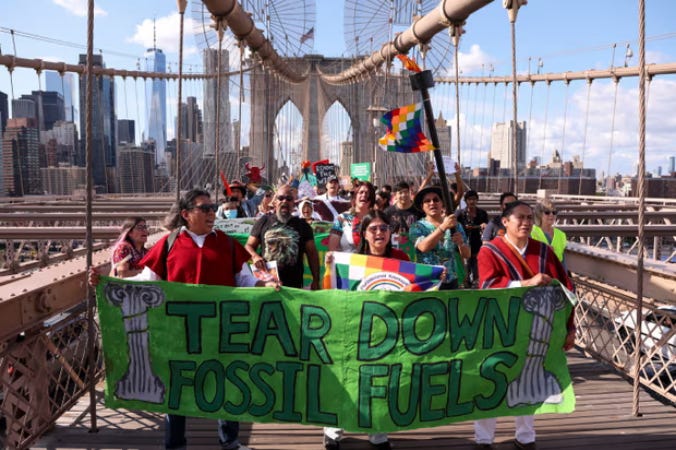Hurricane Helene, European Floods, and the Climate Crisis: What’s at Stake for Global Leadership
From Hurricane Helene’s destruction in Florida to catastrophic floods in Europe, the climate crisis demands stronger global leadership—and the upcoming U.S. election could decide our collective future
As Hurricane Helene slammed into the Big Bend area of Florida last night, its winds reached a devastating 140 miles per hour, making it one of the strongest hurricanes in recent years. At the same time, Central Europe is reeling from record-breaking floods, with heavy rainfall across countries like Austria, Czech Republic, and Poland. Both of these events are stark reminders of the escalating climate crisis, and they are happening at a critical time for global leadership, as the 2024 U.S. election approaches.

Hurricane Helene: The Latest in a Series of Catastrophic U.S. Storms
Hurricane Helene, a Category 4 storm, has left a trail of destruction across Florida, Georgia, and parts of the Carolinas. With more than 45 lives lost and millions without power, the storm is expected to cause $15 to $26 billion in property damage. This makes Helene the eighth Category 4 or 5 storm to hit the U.S. in the past eight years—a number that matches the total landfalls of storms this strong from the previous 57 years.
NOAA experts point to record-warm ocean temperatures as a critical factor driving the increase in severe hurricanes. Climate scientists like Jeff Masters emphasize that warmer oceans provide more energy to storms, making them more destructive. The damage caused by Helene is not just a weather event; it’s a consequence of climate inaction.
Flooding in Central Europe: A Deadly Reminder of the Climate Crisis
Meanwhile, Europe is experiencing one of its worst flooding events in recent history, with heavy rains linked directly to global warming. Torrential downpours have devastated towns in countries like the Czech Republic and Austria, leaving dozens dead and triggering widespread damage. According to the World Weather Attribution (WWA), these extreme weather events were twice as likely due to human-caused global warming, and the storms themselves were 7% stronger because of the increased capacity for warm air to hold moisture.
Floodwaters have engulfed homes, wiped out infrastructure, and triggered mudslides. In towns like Jesenik, the aftermath has left people breathing in toxic dust and coping with contaminated water. The floods serve as a sobering reminder that climate change isn’t a future problem; it’s a current catastrophe.

The Bigger Picture: What This Means for Global Leadership
The growing frequency of climate-related disasters is raising critical questions about global leadership. The recent climate summit in New York saw prominent voices like John Kerry and Al Gore criticizing the world’s largest emitters, including the U.S. and China, for failing to meet their commitments to reduce reliance on fossil fuels. Despite promises made during COP28 in Dubai, fossil fuel production has surged, locking in decades of future emissions.
In the U.S., this failure to act is playing out against the backdrop of the 2024 presidential election. Former President Donald Trump, who has called climate change a hoax, has vowed to dismantle Biden’s climate policies if he is re-elected. Meanwhile, Vice President Kamala Harris offers a stark contrast, supporting aggressive climate action and international cooperation to reduce carbon emissions. The stakes of this election could not be higher, as the next president will decide whether the U.S. leads the fight against climate change or further delays meaningful action.
Climate activists marched on the Brooklyn Bridge last Friday to protest fossil fuels in New York City, New York. The march kicked off a global week of climate strikes worldwide. Photograph: Sarah Yenesel/EPA
What the Future Holds: A Call for Action
Hurricane Helene and the floods in Europe are not isolated incidents—they are part of a broader trend that shows the increasing urgency of addressing the climate crisis. As António Guterres, the UN Secretary-General, has warned, nations that continue to hand out new oil and gas licenses are “signing away our future.”
Al Gore recently pointed out that while renewable energy investments are increasing, particularly in China, the transition away from fossil fuels must happen much faster. If the U.S. does not take a leading role, the world risks passing critical tipping points, where the effects of climate change become irreversible.
Conclusion: The 2024 U.S. Election and the Global Fight Against Climate Change
The stakes of the 2024 U.S. election extend far beyond domestic politics. With the world facing an unprecedented climate crisis, the U.S. has an opportunity—and a responsibility—to lead the way in reducing emissions and transitioning to renewable energy. If Trump returns to power, the progress made under Biden’s administration could be undone, with devastating consequences for both the U.S. and the planet.
However, with leaders like Kamala Harris, who is committed to strengthening climate policies, the U.S. could become a beacon of hope for other nations struggling to meet their climate goals. As both Hurricane Helene and the floods in Central Europe demonstrate, the time for action is now. The outcome of the upcoming election could very well decide the future of climate leadership—and, by extension, the future of life on Earth.
This is how Trump responds to questions about the shift from combustible engines to electric engines.
We’re in this together,
Franky from Palma de Mallorca ( Spain)





